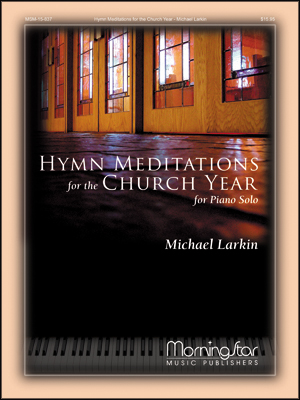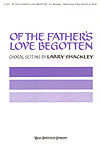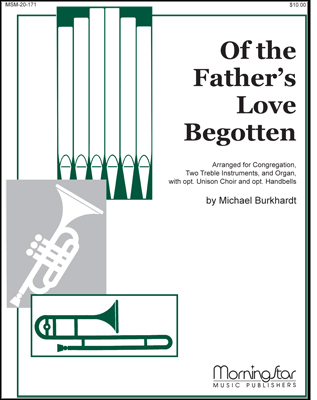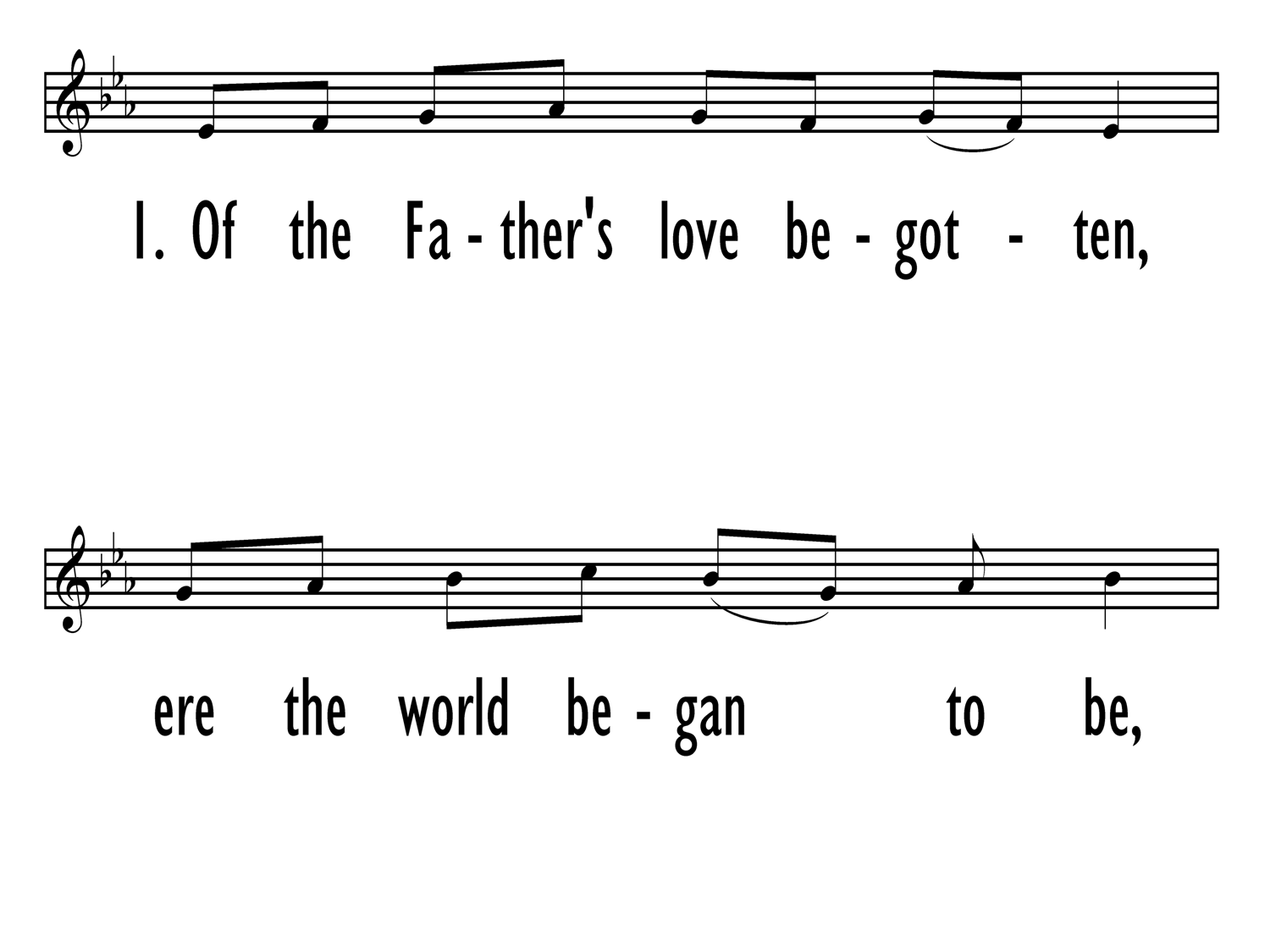- |
User Links
Of the Father's Love Begotten

Of the Father's love begotten, ere the worlds began to be
Translator: J. M. Neale; Translator: H. W. Baker; Author: Aurelius Clemens PrudentiusTune: DIVINUM MYSTERIUM
Published in 214 hymnals
Printable scores: PDF, MusicXMLPlayable presentation: Lyrics only, lyrics + musicAudio files: MIDI, Recording
Representative Text
1 Of the Father’s love begotten,
ere the worlds began to be,
He is Alpha and Omega,
He the Source, the Ending He,
of the things that are, that have been,
and that future years shall see
evermore and evermore!
2 O that birth forever blessed,
when a virgin, full of grace,
by the Holy Ghost conceiving,
bore the Savior of our race;
and the Babe, the world’s Redeemer,
first revealed His sacred face,
evermore and evermore!
3 This is He whom heav'n-taught singers
sang of old with one accord,
whom the Scriptures of the prophets
promised in their faithful word;
now He shines, the long-expected;
let creation praise its Lord,
evermore and evermore!
4 O ye heights of heav'n, adore Him;
angel hosts, His praises sing:
pow'rs, dominions, bow before Him
and extol our God and King;
let no tongue on earth be silent,
every voice in concert ring,
evermore and evermore!
5 Christ, to Thee with God the Father,
and, O Holy Ghost, to Thee,
hymn and chant and high thanksgiving
and unwearied praises be,
honor, glory, and dominion,
and eternal victory,
evermore and evermore!
Source: Psalms and Hymns to the Living God #252
Translator: J. M. Neale
 John M. Neale's life is a study in contrasts: born into an evangelical home, he had sympathies toward Rome; in perpetual ill health, he was incredibly productive; of scholarly temperament, he devoted much time to improving social conditions in his area; often ignored or despised by his contemporaries, he is lauded today for his contributions to the church and hymnody. Neale's gifts came to expression early–he won the Seatonian prize for religious poetry eleven times while a student at Trinity College, Cambridge, England. He was ordained in the Church of England in 1842, but ill health and his strong support of the Oxford Movement kept him from ordinary parish ministry. So Neale spent the years between 1846 and 1866 as a warden of Sackvi… Go to person page >
John M. Neale's life is a study in contrasts: born into an evangelical home, he had sympathies toward Rome; in perpetual ill health, he was incredibly productive; of scholarly temperament, he devoted much time to improving social conditions in his area; often ignored or despised by his contemporaries, he is lauded today for his contributions to the church and hymnody. Neale's gifts came to expression early–he won the Seatonian prize for religious poetry eleven times while a student at Trinity College, Cambridge, England. He was ordained in the Church of England in 1842, but ill health and his strong support of the Oxford Movement kept him from ordinary parish ministry. So Neale spent the years between 1846 and 1866 as a warden of Sackvi… Go to person page >Translator: H. W. Baker
 Baker, Sir Henry Williams, Bart., eldest son of Admiral Sir Henry Loraine Baker, born in London, May 27, 1821, and educated at Trinity College, Cambridge, where he graduated, B.A. 1844, M.A. 1847. Taking Holy Orders in 1844, he became, in 1851, Vicar of Monkland, Herefordshire. This benefice he held to his death, on Monday, Feb. 12, 1877. He succeeded to the Baronetcy in 1851. Sir Henry's name is intimately associated with hymnody. One of his earliest compositions was the very beautiful hymn, "Oh! what if we are Christ's," which he contributed to Murray's Hymnal for the Use of the English Church, 1852. His hymns, including metrical litanies and translations, number in the revised edition of Hymns Ancient & Modern, 33 in all. These were cont… Go to person page >
Baker, Sir Henry Williams, Bart., eldest son of Admiral Sir Henry Loraine Baker, born in London, May 27, 1821, and educated at Trinity College, Cambridge, where he graduated, B.A. 1844, M.A. 1847. Taking Holy Orders in 1844, he became, in 1851, Vicar of Monkland, Herefordshire. This benefice he held to his death, on Monday, Feb. 12, 1877. He succeeded to the Baronetcy in 1851. Sir Henry's name is intimately associated with hymnody. One of his earliest compositions was the very beautiful hymn, "Oh! what if we are Christ's," which he contributed to Murray's Hymnal for the Use of the English Church, 1852. His hymns, including metrical litanies and translations, number in the revised edition of Hymns Ancient & Modern, 33 in all. These were cont… Go to person page >Author: Aurelius Clemens Prudentius
Marcus Aurelius Clemens Prudentius, "The Christian Pindar" was born in northern Spain, a magistrate whose religious convictions came late in life. His subsequent sacred poems were literary and personal, not, like those of St. Ambrose, designed for singing. Selections from them soon entered the Mozarabic rite, however, and have since remained exquisite treasures of the Western churches. His Cathemerinon liber, Peristephanon, and Psychomachia were among the most widely read books of the Middle Ages. A concordance to his works was published by the Medieval Academy of America in 1932. There is a considerable literature on his works. --The Hymnal 1940 Companion… Go to person page >Text Information
Related Texts
| First Line: | Of the Father's love begotten, ere the worlds began to be |
| Title: | Of the Father's Love Begotten |
| Latin Title: | Corde natus ex parentis |
| Author: | Aurelius Clemens Prudentius |
| Translator: | J. M. Neale |
| Translator: | H. W. Baker |
| Meter: | 8.7.8.7.8.7.7 |
| Source: | Latin |
| Place of Origin: | Spain |
| Language: | English |
| Copyright: | Public Domain |
| Article: | Hymn Interpertation by Joan Halmo (from "The Hymn" 53.4 October 2002) |
- (hymns)
- (hymns)
- (hymns)
- (hymns)
- (hymns)
- (hymns)
- (hymns)
- (hymns)
- (hymns)
- (hymns)
- (hymns)
- (hymns)
- (hymns)
- (hymns)
- (hymns)
- (hymns)
- (hymns)
- (hymns)
- (hymns)
- (hymns)
- (hymns)
- (hymns)
- (hymns)
- (hymns)
- (hymns)
- (hymns)
- (hymns)
- (hymns)
- (hymns)
- (hymns)
- (hymns)
- (hymns)
- (hymns)
- (hymns)
- (hymns)
- (hymns)
- (hymns)
- (hymns)
- (hymns)
- (hymns)
- (hymns)
- (hymns)
- (hymns)
- (hymns)
- (hymns)
- (hymns)
- (hymns)
- (hymns)
- (hymns)
- (hymns)
- (hymns)
- Year A, Christmas season, Christmas Eve
This is recommended for Year A, Christmas season, Christmas Eve by 2 hymnal lectionary indexes including Lift Up Your Hearts: psalms, hymns, and spiritual songs #78. - Year A, Christmas season, Christmas Day
This is recommended for Year A, Christmas season, Christmas Day by 5 hymnal lectionary indexes including Glory to God: the Presbyterian Hymnal #108 and Lift Up Your Hearts: psalms, hymns, and spiritual songs #78. - Year A, Christmas season, Christmas Day
- Year A, Christmas Season, Second Sunday after Christmas Day
This is recommended for Year A, Christmas Season, Second Sunday after Christmas Day by 4 hymnal lectionary indexes including Glory to God: the Presbyterian Hymnal #108. - Year B, Advent, Fourth Sunday
This is recommended for Year B, Advent, Fourth Sunday by 2 hymnal lectionary indexes including Glory to God: the Presbyterian Hymnal #108. - Year B, Advent, Fourth Sunday
- Year B, Christmas season, Christmas Day
This is recommended for Year B, Christmas season, Christmas Day by 4 hymnal lectionary indexes including Glory to God: the Presbyterian Hymnal #108 and Lift Up Your Hearts: psalms, hymns, and spiritual songs #78. - Year B, Christmas season, First Sunday after Christmas Day
This is recommended for Year B, Christmas season, First Sunday after Christmas Day by 2 hymnal lectionary indexes including Lift Up Your Hearts: psalms, hymns, and spiritual songs #78. - Year B, Christmas season, Second Sunday after Christmas Day
This is recommended for Year B, Christmas season, Second Sunday after Christmas Day by 4 hymnal lectionary indexes including Glory to God: the Presbyterian Hymnal #108. - Year B, Lent, Fourth Sunday
- Year B, Easter season, Easter Vigil
- Year B, Easter season, Day of Pentecost
- Year B, Ordinary Time, Proper 29 (34)
This is recommended for Year B, Ordinary Time, Proper 29 (34) by 4 hymnal lectionary indexes including Glory to God: the Presbyterian Hymnal #108 and Lift Up Your Hearts: psalms, hymns, and spiritual songs #78. - Year B, Ordinary Time, Proper 29 (34)
- Year C, Christmas season, Christmas Day
This is recommended for Year C, Christmas season, Christmas Day by 4 hymnal lectionary indexes including Glory to God: the Presbyterian Hymnal #108 and Lift Up Your Hearts: psalms, hymns, and spiritual songs #78. - Year C, Christmas season, Christmas Day
- Year C, Christmas season, New Year's Day
- Year C, Christmas Season, Second Sunday after Christmas Day
This is recommended for Year C, Christmas Season, Second Sunday after Christmas Day by 3 hymnal lectionary indexes including Glory to God: the Presbyterian Hymnal #108. - Year C, Epiphany season, Baptism of the Lord (First Sunday)
This is recommended for Year C, Epiphany season, Baptism of the Lord (First Sunday) by 2 hymnal lectionary indexes including Glory to God: the Presbyterian Hymnal #108. - Year C, Easter season, Sixth Sunday
- Year C, Ordinary Time, Proper 11 (16)
This is recommended for Year C, Ordinary Time, Proper 11 (16) by 2 hymnal lectionary indexes including Glory to God: the Presbyterian Hymnal #108. - Year C, Ordinary Time, Proper 29 (34)
This is recommended for Year C, Ordinary Time, Proper 29 (34) by 2 hymnal lectionary indexes including Glory to God: the Presbyterian Hymnal #108.
Chinese
English
- A Church Hymn Book: for the use of congregations of the United Church of England and Ireland #13
- A Handy Book of Old and Familiar Hymns #45
- A Treasury of Catholic Song: comprising some two hundred hymns from Catholic soruces old and new #23
- Ambassador Hymnal: for Lutheran worship #40
- Anglican Hymns Old and New (Rev. and Enl.) #584
- At Worship: a hymnal for young churchmen #d215
- Australian Hymn Book #215
- Baptist Hymnal (1975 ed) #62
- Baptist Hymnal 1991 #251
- Breaking Bread (Vol. 39) #89 10 shown out of 150
Korean
Spanish
Notes
Scripture References:
st. 1 = Rev. 22:13, Rev. 1:8, Rev. 21:6, Ps. 2:7, Heb. 1:5
st. 2 = Luke 1:35, Luke 2:11, Matt. 1:18, 21
st. 3 = Luke 1:70
st.4 = Ps. 148:1-2, Ps. 150:6
This hymn, with very ancient roots, is a confession of faith about the Christ, the eternal Son of God, whose birth and saving ministry were the fulfillment of ancient prophecies (st. 1-3). The final stanzas are a doxology inspired by John's visions recorded in Revelation 4-7 (st. 4-5). The text is based on "Corde natus ex parentis," a Latin poem by Marcus Aurelius C. Prudentius (b.Saragossa[?], Northern Spain, 348; d. c. 413).
Prudentius was the greatest Christian poet of his time. We know little of his life–only what he tells us in his own writings. He received a fine education, served as a judge and "twice ruled noble cities." He also tells of an appointment at the imperial court in Rome. But at the age of fifty-seven Prudentius bade farewell to this successful, prosperous life and vowed to spend the rest of his days in poverty. He served the church by meditating and writing, presumably at an unnamed monastery. All of his writings are in poetic form, including learned discussions in theology and apologetics. Most of the English hymns derived from his works, including "Of the Father's Love Begotten," were taken from his Liber Cathemerinon (c. 405), which consists of twelve extended poems meant for personal devotions, six for use throughout the hours of the day and six for special feasts.
Working from the Latin text, John Mason Neale (b. London, England, 1818; d. East Grinstead, Sussex, England, 1866) prepared a translation and published it as a six-stanza hymn in his The Hymnal Noted (1854). He retained the refrain "Evermore and evermore," an eleventh-century addition to the original Latin text.
Neale's life is a study in contrasts: born into an evangelical home, he had sympathies toward Rome; in perpetual ill health, he was incredibly productive; of scholarly temperament, he devoted much time to improving social conditions in his area; often ignored or despised by his contemporaries, he is lauded today for his contributions to the church and hymnody. Neale's gifts came to expression early–he won the Seatonian prize for religious poetry eleven times while a student at Trinity College, Cambridge, England. He was ordained in the Church of England in 1842, but ill health and his strong support of the Oxford Movement kept him from ordinary parish ministry. So Neale spent the years between 1846 and 1866 as a warden of Sackville College in East Grinstead, a retirement home for poor men. There he served the men faithfully and expanded Sackville's ministry to indigent women and orphans. He also founded the Sisterhood of St. Margaret, which became one of the finest English training orders for nurses.
Laboring in relative obscurity, Neale turned out a prodigious number of books and artic1es on liturgy and church history, including A History of the So-Called Jansenist Church of Holland (1858); an account of the Roman Catholic Church of Utrecht and its break from Rome in the 1700s; and his scholarly Essays on Liturgiology and Church History(1863). Neale contributed to church music by writing original hymns, including two volumes of Hymns for Children (1842, 1846), but especially by translating Greek and Latin hymns into English. These translations appeared in Medieval Hymns and Sequences (1851, 1863, 1867), The Hymnal Noted (1852, 1854), Hymns of the Eastern Church (1862),
and Hymns Chiefly Medieval (1865). Because a number of Neale's translations were judged unsingable, editors usually amended his work, as evident already in the 1861 edition of Hymns Ancient and Modem; Neale claimed no rights to his texts and was pleased that his translations could contribute to hymnody as the "common property of Christendom."
The story of "Of the Father's Love Begotten" continues with the 1859 nine-stanza revision by Henry W. Baker (b. Vauxhall, Lambeth, Surrey, England, 1821; d. Monk1and, England, 1877), published in Hymns Ancient and Modern (1861). Educated at Trinity College, Cambridge, Baker was ordained in the Church of England in 1844. He became the vicar of the Monkland parish in 1851, where he remained until his death. Because of his high-church beliefs in the celibacy of the clergy, Baker was unmarried. In the history of hymnody Baker is well known as the editor and chairman of the committee that compiled Hymns Ancient and Modern, the most significant British hymnal of the nineteenth century. Baker devoted at least twenty years of his life to this endeavor.
Considered an autocratic editor in his time, Baker freely changed hymn texts, but man' of his decisions have proven themselves over time. The 1875 edition of Hymns Ancient and Modern contained thirty-three of Baker's original hymns and translations.
Liturgical Use:
Christmas season; without stanza 2 on many other occasions; because the original Latin poem concerns Christ’s miracles, could be sung during Epiphany or at worship services when the New Testament gospel is preached; stanza 4 and 5 make a fine doxology for the close of any service.
--Psalter Hymnal Handbook
==========================
Of the Father's love begotten. This translation was given in the trial edition of Hymns Ancient & Modern, 1859, as "Of the Father's will begotten," but in the first edition of 1861 it was given in its well-known form in 9 stanzas of 6 lines with the refrain, the additional stanzas being supplied by the Hereford Breviary text. The Hymns Ancient & Modern translation by Dr. Neale and Sir H. W. Baker is thus composed:—i. Neale; altered ii., iii., Baker; iv.-vi., Neale altered ; vii., Baker; viii., Neale altered ; ix., Baker. This arrangement was repeated in the revised Hymns Ancient & Modern 1875, and is the most popular translation of the hymn in common use. Usually, however, compilers introduce changes and abbreviations in their own account, and not always to the advantage of the hymn. These changes are easily found by collating any given text with Hymns Ancient & Modern.
--Excerpt from John Julian, Dictionary of Hymnology (1907)
Tune
DIVINUM MYSTERIUMDIVINUM MYSTERIUM is a plainsong, or chant, associated with the “Divinum mysterium” text in manuscripts dating from the twelfth to fifteenth centuries. The tune was published in triple meter in Theodoricis Petri's Piae Cantiones (1582). Some hymnals retain the dance-like triple meter, while othe…
For Leaders
In the early fourth century, one of the greatest controversies in the church came to a breaking point, and the Emperor Constantine called together the First Council of Nicea to establish once and for all the Church’s official stance on the nature of the Trinity. The council condemned the teaching of Arius, who believed that Jesus was not of the same nature as God the Father. The Nicene Creed was thus written as a statement of faith that God the Father, God the Son, and God the Spirit are all of the same nature, three and yet one. Prudentius’ hymn, “Of the Father’s Love Begotten,” addresses this belief in the Trinity in the very first line. It is very clear from his text that Christ is both human and divine, and rather than simply being made by God, he was “begotten” of the very same substance. As we sing this hymn, we both affirm and align our faith with the broader faith of the Church, and we deny any belief that says that Christ is not fully divine. This hymn, so often associated with Christmas, is thus a hymn of proclamation, calling us to sing out our faith – “every voice in concert ring, evermore and evermore!”
Text:
In the beginning of the fifth century, Aurelius Clemens Prudentius began his major work, Liber Cathemerinon, containing twelve long poems, one for each hour of the day. Lines selected from the ninth of these poems made up this eight-stanza hymn which Albert Bailey describes as a “fighting hymn,” since the words directly attack the heresy of Arius, who claimed that Christ did not have the same nature as God (The Gospel in Hymns, 223). The first stanza claims that Christ is in fact “begotten” of God, and the remainder of the verses explain Christ’s nature by alluding to the prophesies of His birth, the event of His birth, and praise of Christ and the Triune God.
There are a number of differences in the text between different hymnals. The most common difference is the inclusion or exclusion of a verse beginning, “This is he whom heav’n-taught singers…,” often included as the third verse. Other differences include the change from archaic to modern language, or references to “the Virgin” versus “a virgin.”
Tune:
DIVINUM MYSTERIUM is a plainsong melody from a Sanctus that most likely comes from the thirteenth century. Some hymnals keep the original unmeasured form of the chant, while others use a triple-meter that was introduced in 1582. Like any chant, this hymn is particularly beautiful when sung a cappella, or with a very light accompaniment that simply provides a foundation upon which the voices can rest. It would be very appropriate to have a choir sing this hymn – there are a number of beautiful choral arrangements, not the least of which is one written by Paul Wohlgemuth.
When/Why/How:
This hymn is most often sung at Christmas time, but only the second verse actually refers to the nativity story, and so without that verse, it could be sung throughout the year. It would be especially fitting during a service about the miracles of Christ (or Epiphany season), or as a hymn of response to the recitation of the Nicene Creed. The fourth and fifth verses also make a wonderful doxology for the closing of a service.
Suggested Music:
- Grier, Gene. Of the Father's Love Begotten - Two-part mixed choir and piano
- Shackley, Larry. Of the Father's Love Begotten - SATB with optional Clarinet or Viola
- Larson, Lloyd. Joy of Every Longing Heart - Choir and piano- paires "Of the Father's Love Begotten" with "Jesu,Joy of Man's Desiring"
- Burckhardt, Michael. Of the Father's Love Begotten - Unison voices (Choir and/or Congregation), Organ, Handbells, Two Instruments
Laura de Jong, Hymnary.org
Timeline
Arrangements
Media
Worship and Rejoice #181
- MIDI file from Baptist Hymnal 1991 #251
- MIDI file from The Cyber Hymnal #4821
- Audio recording from Evangelical Lutheran Worship #295
- Audio recording from Glory to God: the Presbyterian Hymnal #108
- Audio recording from Lift Up Your Hearts: psalms, hymns, and spiritual songs #78
- Audio recording from Lift Up Your Hearts: psalms, hymns, and spiritual songs #78
- Audio recording from Lift Up Your Hearts: psalms, hymns, and spiritual songs #78
- MIDI file from Psalter Hymnal (Gray) #342
- MIDI file from Psalter Hymnal (Gray) #342
- Audio recording from The Worshiping Church #145
- Audio recording from The United Methodist Hymnal #184
- Audio recording from Worship and Rejoice #181
- MIDI file from Worship and Rejoice #181
- MIDI file from With Heart and Voice: songs for all God's children #75
- MIDI file from With Heart and Voice: songs for all God's children #75


 My Starred Hymns
My Starred Hymns







